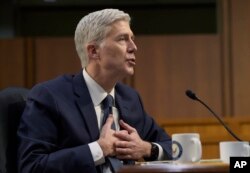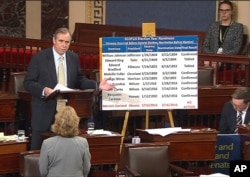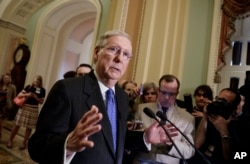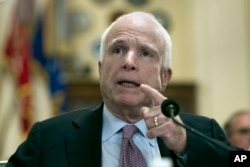With a Supreme Court vacancy hanging in the balance, the U.S. Senate is poised to make a historic change in its voting rules Thursday, with members of both parties warning of perils that could alter the chamber.
Republicans are expected to use their majority to change Senate rules and eliminate the filibuster for Supreme Court nominees, a move that has been called the "nuclear option" as it would erode minority party rights in the chamber.
"We are in a terrible place," said Republican Senator John McCain of Arizona, as his party prepared to change Senate rules and prevent Democrats from blocking President Donald Trump's Supreme Court nominee, Judge Neil Gorsuch. "I fear that someday we will regret what we are about to do."
A filibuster of Gorsuch and a rules change is something senators of neither party said they want. But Democrats insisted they have no choice but to demand a three-fifth's majority to get to a final vote on a nominee for a high court vacancy — a vacancy Republicans prevented former President Barack Obama from filling when Justice Antonin Scalia died early last year.
"For the first time in history, we are considering a nominee for a stolen Supreme Court seat, and that alone should be reason for everyone who cares about this institution to turn down this nominee," said Democratic Senator Jeff Merkley of Oregon at the end of a 15-hour floor speech.
"We should not be considering a nominee from a president who is under investigation for conspiring with Russia to change the outcome of an election."
Harsh rhetoric was not limited to Democrats. Republicans accused them of blind and pointless obstructionism.
"It seems many Democrats decided long ago to oppose anybody the president nominated," said Majority Leader Mitch McConnell, a Kentucky Republican. "Democrats would filibuster [liberal Justice] Ruth Bader Ginsburg if President Trump nominated her, and we know why. Democrats are bowing to hard-left interests that can't get over the results of the election and, thus, are demanding complete Democratic opposition to everything this president touches."
If Republicans invoke the so-called "nuclear option," Gorsuch would be confirmed with a simple majority vote.
"He [Gorsuch] will be confirmed as our next Supreme Court justice," predicted Republican Senator John Cornyn of Texas. "But it's up to our Democratic friends to determine just how that occurs."
"I hope Democrats re-evaluate their position," McConnell said. "I hope they'll consider what their actions would mean for future Supreme Court nominations. I hope they'll consider what their actions could mean for the future of this body more broadly."
Democrats eliminated the filibuster for executive branch and non-Supreme Court judicial nominees when they controlled the chamber in 2013, but have drawn a distinction between their action and what Republicans are vowing to do.
"Cabinet secretaries come and go. Supreme Court justices do not," said Democratic Senator Brian Schatz of Hawaii. "This administration's Cabinet is like a date, a really bad date, but at least it comes to an end. A Supreme Court justice on the other hand is not a date. That's a marriage. It's a lifetime appointment.
"Without this rule [the filibuster], if you're a member of the minority party, the president's nominees don't have to listen to you, meet with you, think about you. Without this rule, advice and consent is rendered meaningless for whichever party is out of power," Schatz added.
In 2005, McCain was part of a bipartisan group of senators, known as the Gang of 14, that worked to prevent filibusters of judicial nominees put forward by then-President George W. Bush. The gang succeeded and the nuclear option was averted. Speaking on the Senate floor Wednesday, McCain lamented that no such gang has materialized this week.
"I've had conversations will colleagues on both sides of the aisle in an attempt to once again come up with a way forward and avoid both a filibuster of Judge Gorsuch and the nuclear option," McCain said. "Sadly … those efforts have failed.
"My colleagues should understand that this is a historic moment. What we are poised to do at the end of this week will have tremendous consequences," the Arizona Republican added.
A rules change ending the filibuster would set the stage for Gorsuch's confirmation Friday.








